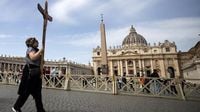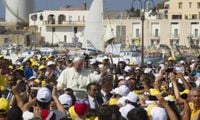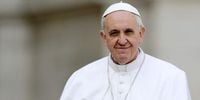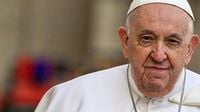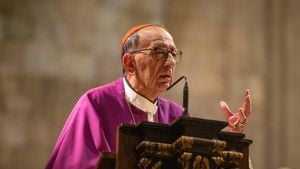Pope Francis, the first Jesuit and South American pope, died on Monday, April 21, 2025, at the age of 88, marking the end of a transformative 12-year pontificate that began on March 13, 2013. His death was announced by the Vatican, which stated that he passed away at 07:35 AM, returning to the "house of the Father." This news comes just a month after he was hospitalized for severe pneumonia, a condition that had led to his fourth and longest hospitalization since becoming pope.
Jorge Bergoglio, who took the name Francis, was known for his progressive stance on various issues, including migration, social justice, and environmental concerns. His commitment to these causes was evident throughout his papacy, as he frequently emphasized the importance of caring for the marginalized and advocating for peace.
Shortly after his election, on March 28, 2013, Pope Francis made headlines by washing the feet of 12 young prisoners during a Holy Thursday mass in Rome, breaking with tradition to include two young girls—one Christian and one Muslim. This act symbolized his dedication to humility and service, traits that defined his leadership style.
His first papal trip took him to Lampedusa on July 8, 2013, where he threw a wreath of white flowers into the Mediterranean Sea to honor the thousands of migrants who had lost their lives attempting to cross to Europe. This poignant gesture underscored his ongoing commitment to advocating for refugees and highlighting their plight.
Throughout his tenure, Pope Francis was not without controversy. He faced significant opposition from conservative factions within the Church, particularly regarding his more liberal views on issues such as same-sex marriage and the role of women in the Church. In December 2014, during his greetings to the Roman Curia, he listed 15 ailments plaguing the high clergy, including "spiritual Alzheimer's" and the "terrorism of gossip," highlighting the need for reform within the Church.
One of the most notable moments in his papacy came on February 12, 2016, when he shared a historic handshake with Patriarch Kirill of the Russian Orthodox Church, marking the first meeting between the leaders of Eastern and Western Christianity since the Great Schism of 1054. However, the relationship soured following the onset of the war in Ukraine in February 2022, which created tensions between the Vatican and the Russian Orthodox Church.
On March 27, 2020, Pope Francis delivered an "Urbi et Orbi" blessing in a deserted St. Peter's Square during the height of the COVID-19 pandemic, a powerful image that resonated worldwide as he prayed for an end to the crisis. This moment captured the isolation felt by many during the pandemic, reinforcing his role as a source of hope and comfort.
In 2021, he made a historic visit to Iraq, where he met with Ayatollah Ali Al-Sistani, a prominent Shiite leader, further emphasizing his commitment to interfaith dialogue. His efforts to bridge divides between religions were evident throughout his papacy, which included signing a document on human fraternity with the Imam of Al-Azhar in 2019.
In July 2022, during a penitential pilgrimage in Canada, Pope Francis publicly apologized for the Catholic Church's role in the abuse of Indigenous children in residential schools, acknowledging the pain and suffering caused by these actions. His heartfelt gestures, such as embracing survivors, showcased his desire for reconciliation.
As the world mourns his passing, international leaders have expressed their condolences. Swiss President Karin Keller-Sutter called him "a great spiritual leader and a tireless defender of peace," while French President Emmanuel Macron paid tribute to his compassion for the vulnerable. Other leaders, including the Israeli President Isaac Herzog and Italian Prime Minister Giorgia Meloni, also recognized his profound impact.
In the wake of his death, a nine-day mourning period has been established, with a conclave expected to take place within 15 to 20 days to elect his successor. Cardinal Kevin Farrell will serve as the interim leader during this time. Pope Francis had previously expressed his wish to be buried in the Basilica of Saint Mary Major, rather than the traditional burial site in St. Peter's Basilica, a significant departure from centuries of papal tradition.
Despite his declining health, which included multiple hospitalizations and surgeries, Pope Francis remained dedicated to his duties. He continued to make public appearances, including a crowd bath in his "papamobile" during Easter celebrations just days before his passing, although he appeared visibly weakened.
His papacy was marked by a commitment to addressing the pressing issues of our time, including climate change, poverty, and human rights. His encyclical "Laudato si'" in 2015 called for urgent action to protect the environment, reflecting his concern for future generations.
Pope Francis's approach to leadership was characterized by a focus on the "peripheries" of society, advocating for those often overlooked by the Church. He sought to reform the Vatican's bureaucracy, promote the inclusion of women and laypeople in Church matters, and address the ongoing crisis of sexual abuse within the Church.
As the Catholic Church faces the challenge of finding a successor, Pope Francis leaves behind a legacy of compassion, reform, and a call for a more inclusive and caring Church. His influence extended far beyond the walls of the Vatican, resonating with millions around the globe who found inspiration in his messages of love, hope, and social justice.
